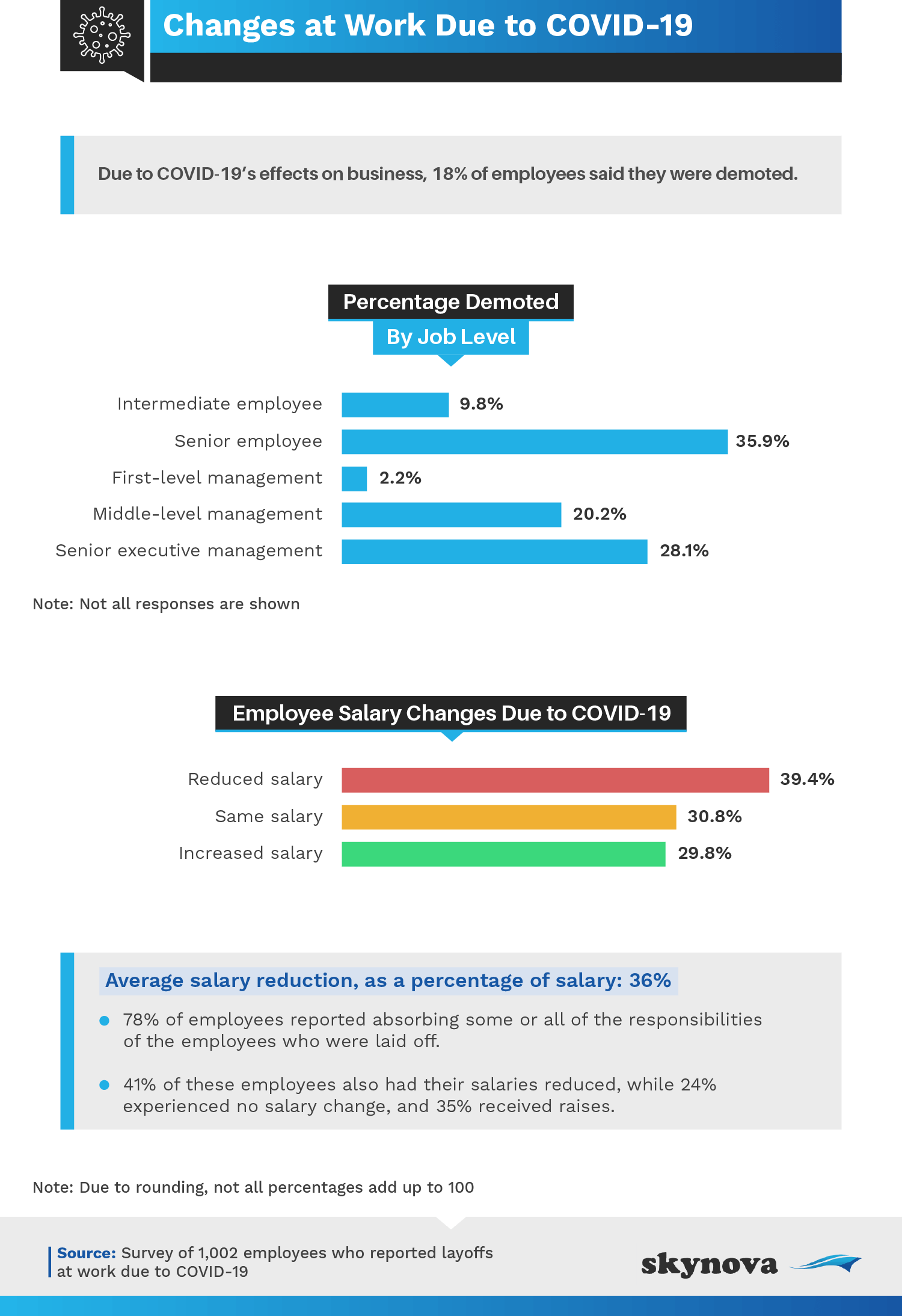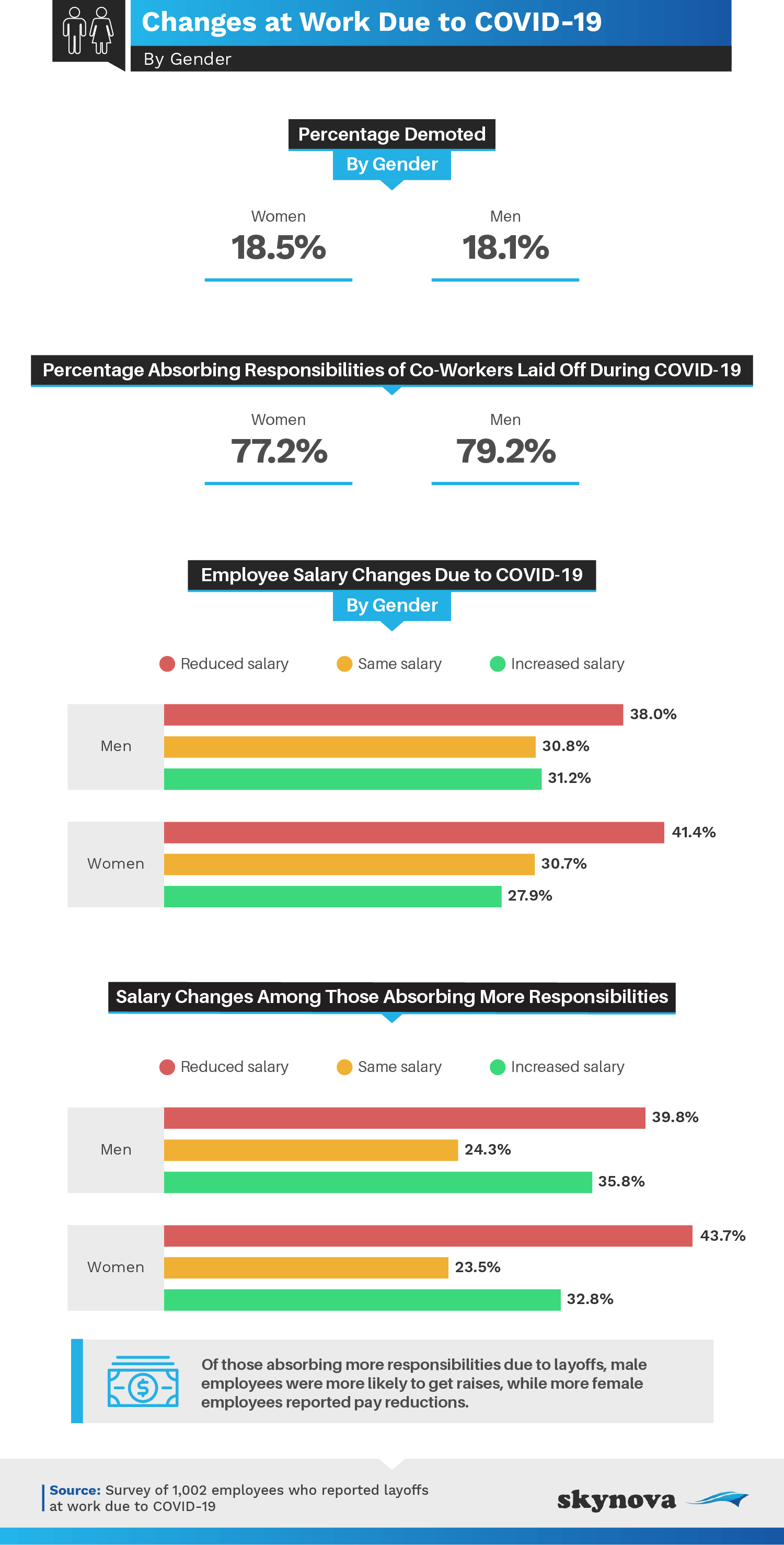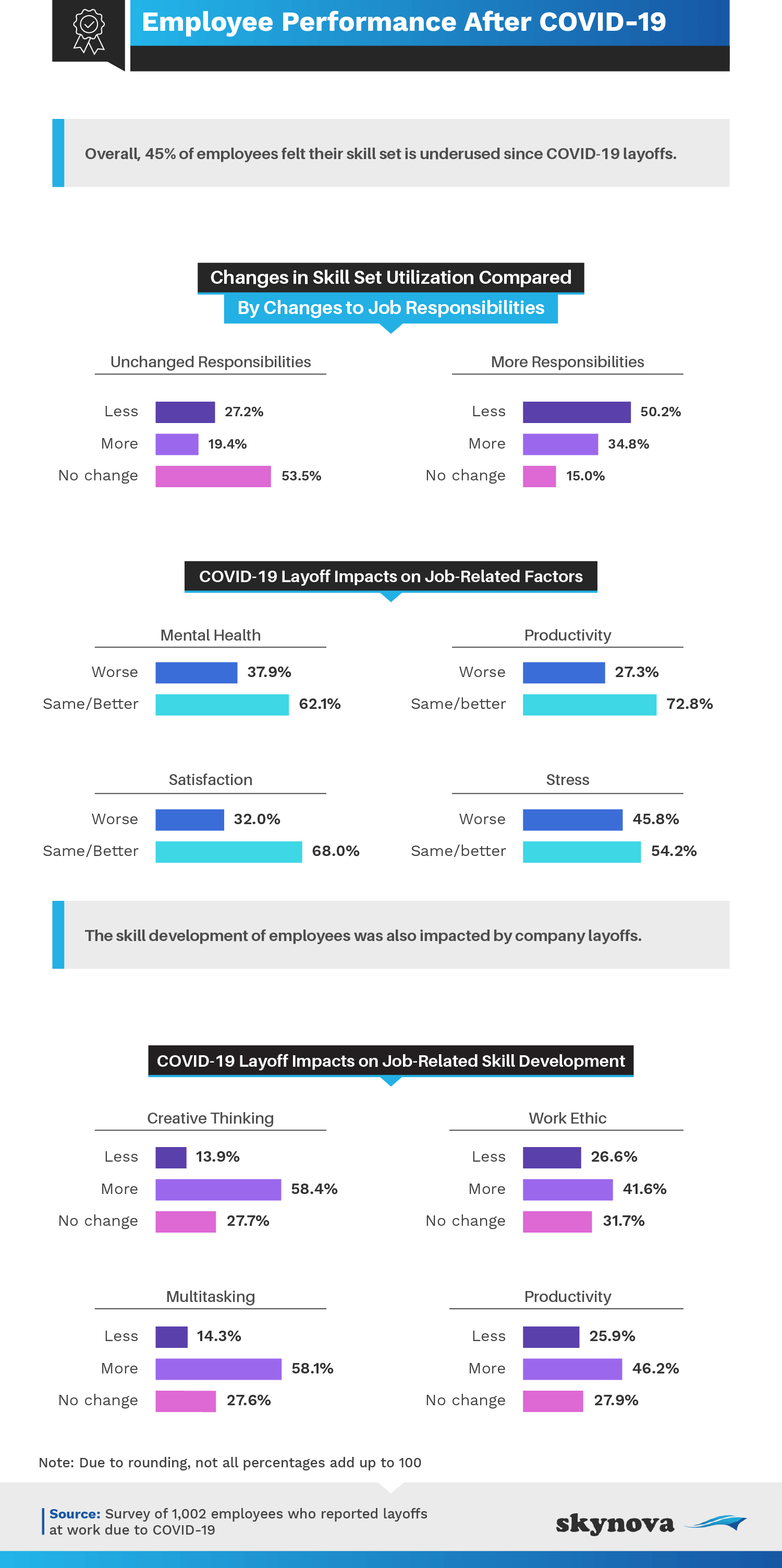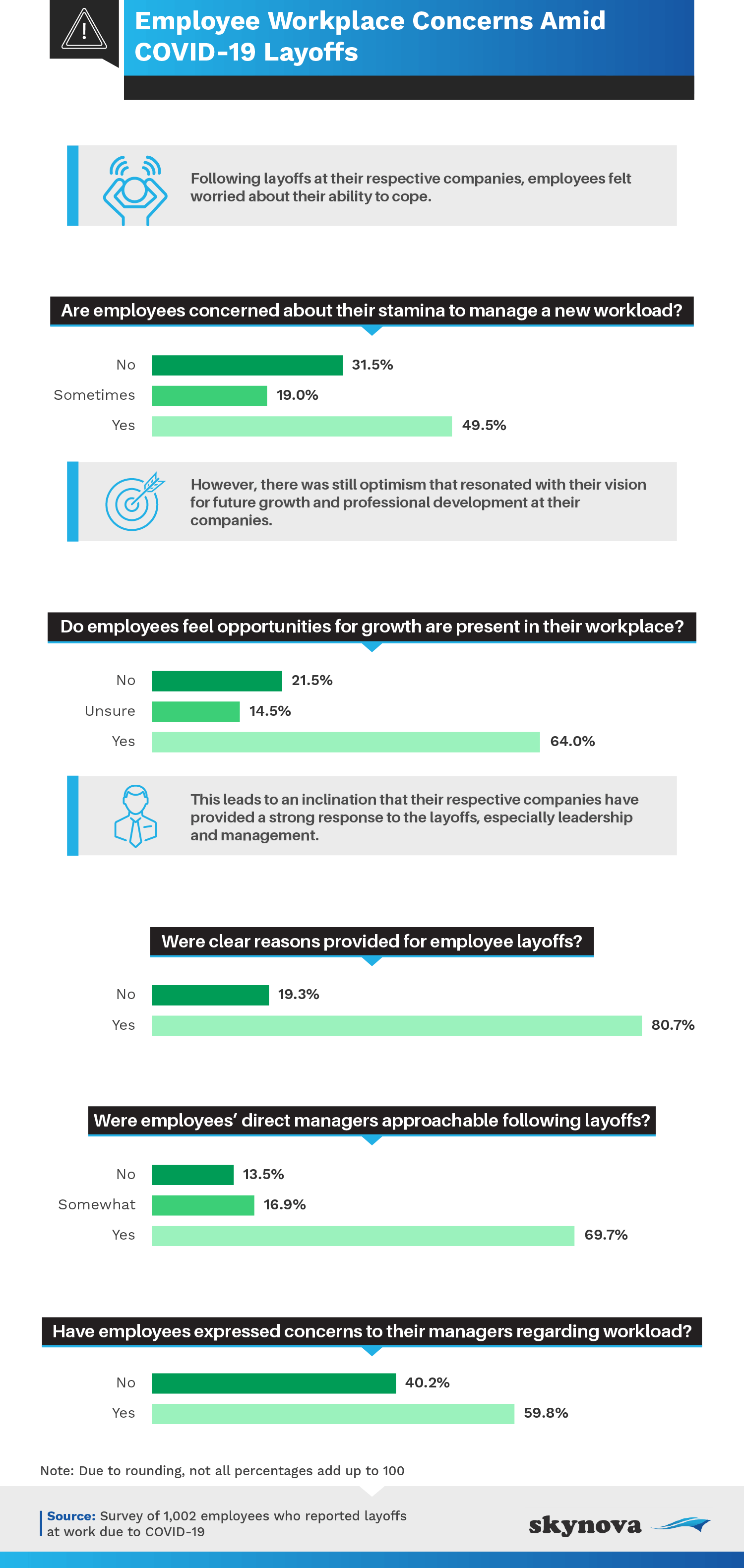
|
In October 2020, the unemployment rate in the U.S. was 7.9%, a number largely exacerbated by the economic impact of the global COVID-19 pandemic. For some businesses, long-term and permanent closures have forced many Americans into unemployment. For other businesses, layoffs are a drastic cost-saving measure to help companies survive reduced spending and dwindling profits.
Among businesses trying to navigate the pandemic and its persisting impact to the U.S. economy and workforce, there are other cost-saving measures that may be implemented. Across the country, many businesses are implementing hiring freezes, compensation adjustments, and demoting senior staff as a way to reduce payroll spending and stay operational.
And while they may not be out of work, the impact on these efforts to save money on payroll costs can create tremendous stress among employees and managers. For a closer look, we surveyed over 1,000 people for their perspective after their company made personnel and payroll changes as a result of COVID-19. Read on as we explore how many working Americans have been demoted since the pandemic began, how their salaries have changed, and how they’re managing their new workloads as they adapt to the new normal in the U.S. workforce.
As a result of the COVID-19 pandemic, 18% of employees indicated they’d been demoted as a part of cost-saving precautions taken by their companies. Among these, we found demotions were most common among senior employees (36%), followed by senior or executive personnel (28%), middle-level management (20%), and intermediate employees (10%). Just 2% of first-level management employees indicated receiving a demotion due to COVID-19.

More common than being demoted, over 39% of employees also reported taking a reduced salary from their companies due to COVID-19. And although another 31% indicated no salary change at all, we found 30% of employees received increased salaries at their jobs as a result of the pandemic. Among those receiving salary reductions, the average decrease in annual pay was 36%. Some industries, including those offering delivery services, home fitness, and cleaning services or products have seen major surges in businesses as a result of the pandemic.
With so many becoming unemployed due to the pandemic, 78% of employees indicated absorbing some or all of the responsibilities of those who had been laid off. Forty-one percent of employees who reported taking on extra work to make up for team members who had been laid off also said they’d had their salaries reduced.
According to those surveyed, women (18.5%) were slightly more likely than men (18.1%) to be demoted at their jobs due to the pandemic. In contrast, men (79%) were more likely than women (77%) to report taking on additional responsibilities to help make up for co-workers who were laid off due to COVID-19.

Women were also more likely to experience reductions to their salaries during the pandemic. Compared to 38% of men who had their pay negatively impacted due to the virus, 41% of women reported having their compensation reduced. Women were also less likely than men to have received an increase in their salary during the pandemic.
Among those surveyed, 44% of women reported taking on additional responsibilities at work and having had their salaries reduced, compared to 40% of men.
Taking on additional responsibilities to load balance in the wake of layoffs or budget reductions during the pandemic can make employees feel the full extent of their skills or talents are being underutilized. Forty-five percent of respondents said their skill sets were being underused since COVID-19 layoffs took place.

Compared to 53% of employees whose responsibilities hadn’t changed during the pandemic and also said they felt their skill set usage was the same, 50% of employees taking on more responsibilities after layoffs felt their skills were less utilized. Forty-six percent of employees polled also indicated experiencing more stress since layoffs at their company, in addition to those feeling less productive (27%), less satisfied with their work (32%), and worse about their mental health (38%).
In an effort to adapt to the changing workforce due to COVID-19, 58% of employees said they were using their creative thinking and multitasking more than they had before the pandemic. Still, not every change has been positive. Twenty-seven percent of employees said they were utilizing their work ethic less, and roughly as many were developing less productivity.
As 2020 draws to a close, a majority of Americans are feeling burned out at work. Many attribute this to the pandemic as a result of their workloads, balancing work and home life, and performance expectations from their jobs.

Following layoffs at their companies, 69% of respondents admitted they were worried or sometimes worried about their ability to manage their new workload. Still, there was some optimism for the future: 64% of employees said they felt there were still growth opportunities at their jobs. Nearly 81% percent also indicated there were clear reasons given for employees who were laid off. Another positive sign, 70% of employees indicated their managers were approachable after layoffs issued by their companies, and 60% said they’d expressed concerns to their manager about their workloads.
The COVID-19 pandemic has changed the American workforce and touched virtually every industry in one way or another. While millions of U.S. employees are still unemployed due to the pandemic, those who remain are still adjusting to cost-saving measures including layoffs, salary reductions, and demotions.
Nearly 2 in 5 employees polled reported having their salaries reduced during the pandemic, and a vast majority indicated picking up additional responsibilities after their co-workers were laid off. More than 2 in 3 employees also admitted they were worried about their stamina or ability to manage these new workloads. As we found, women were more likely than men to have reduced salaries and added responsibilities at work due to pandemic-related layoffs.
Skynova specializes in invoicing solutions for small businesses and provides a full ecosystem of invoicing, accounting, time sheets, and work order applications designed to work together or independently based on your business needs. In addition to these services, Skynova also produces reports like these for an in-depth look at topics most relevant to the workforce today. These studies focus on business, technology, sports, health, and more using unique research, statistics, and analysis.
We surveyed 1,002 respondents ranging in age from 19 to 75 in order to explore effects of company contraction. The mean age was 36.74 with a standard deviation of 10.53 years. Roughly 43% of our respondents identified as female, and about 57% identified as male.
Survey data has certain limitations related to self-reporting. These limitations include telescoping, exaggeration, and selective memory. We didn’t weight our data or statistically test various hypotheses. This was a purely exploratory project that examines the effects of company contraction.
We encourage you to share the results of this COVID-era workplace study with your readers for any noncommercial use. Please include a link back to this page in your story so readers have access to our complete findings and survey methods and as credit to our team for their work compiling this data.